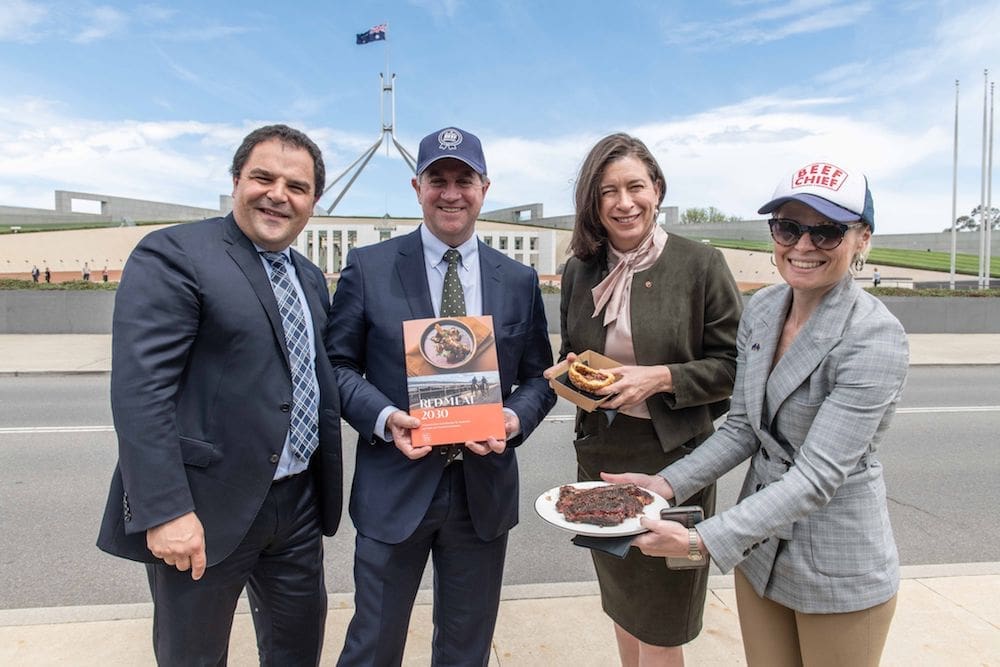
Tony Pasin MP, AMIC Chair Lachie Hart, Senator Susan McDonald, RMAC CEO Anna Campbell.
THE red meat industry strategic plan developed over the past year will guide the whole red meat industry to achieve its potential over the next 10 years, RMAC independent chair Don Mackay told the Red Meat 2030 plan launch event in Canberra on Wednesday.
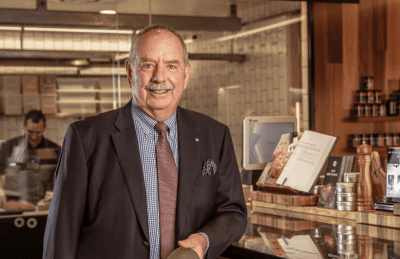
Don Mackay. Picture: Red Meat 2030
Mr Mackay said the plan also sends a clear signal to government and the community of the red meat sector’s intention to grow and develop sustainably as it contines to make a significant contribution to food security both in Australia and around the world.
“It also demonstrates the role our industry plays in mainly regional Australia as an employer of over 400,000 people and as custodian of vast areas of the entire national estate,” he said.
Mr Mackay thanked the many organisations and individuals across the sector who helped to develop the plan, saying the industry has set itself “challenging goals to achieve”.
“To achieve this there is much to be done by industry leadership, but more importantly by the 80,000 businesses that make up our industry, and especially by Governments.”
Specific challenges and opportunities he singled out included:
Halving the cost of regulatory and industry compliance: “an important goal that will require industry to continue to demonstrate its capacity to self-regulate and for government to recognise this and work with us to achieve the savings on offer. Much of this is in the processing part of the supply chain but is evident in all areas including production and live export.”
Reducing trade barriers by $1bn: “(This) is vital and achievable if we work actively together on the opportunities. Especially the non-tariff barriers. We need to pursue these more aggressively to lock in the benefits sooner.”
Doubling value of red meat sales within 10 years: “We need significantly more investment across the entire supply chain. We are looking to triple the value of capital accessed. This capital needs to be a mix of both domestic and international. Providing an environment where investors see the value of our industry as a sound long term financial investment and that they continue to see Australia as a place with low sovereign risk, were governments demonstrate a desire to support appropriate investments that meet expected standards and agreed outcomes.”
Mr Mackay said the plan will be delivered by focusing investment in six key areas:
- Our People
- Our Customers, Consumers, and Communities.
- Our livestock
- Our Markets
- Our Environment and
- Our Systems
Several initiatives had been agreed to that will help deliver on these key priority areas, he said;
“Firstly, given State governments have stepped back from extension and adoption services for farms and post farm gate businesses this market failure is addressed in our plan.
“We know this gap exists and will fill it by allocating 5-10pc per project to extension of new technology. With $1 billion dollars invested over 5 years that is a sizeable investment and a game changer in how we do things, so our regional businesses get first mover advantage through adopting this new technology.
“Secondly, we will place red meat businesses at the centre of implementation and prioritisation of how levies are spent through a series of Taskforces appointed through an open EOI process. This will give all levy payers an opportunity to have direct input into expenditure programmes that support Red Meat 2030.
“Thirdly, we will communicate differently and better. For so long we have accepted the premise of social license being a one way street and have missed an open and two-way dialogue based on trust and respect with the community. This means unifying our collective policy, communications, community education and marketing approaches to position Australian red meat as an industry of entertainment, enjoyment and national significance. We will really be Red Meat inc.”
Other initiatives outlined in the strategy include:
- The red meat industry will undertake a “skills stocktake” to better inform industry and government on the strategies required to ensure we have a workforce suitable for both current and future jobs.
- Red meat production and farming more generally is well supported and highly regarded by the vast majority of Australians. This is not something we take for granted. Educating customers, consumers and the community is considered critical, particularly with the industry increasingly being attacked by extremist groups seeking to demonise our industry to prosecute ill-defined agendas with inaccurate claims and often through illegal activity. “Education of the community of the long-term sustainability and the enormous value our industry delivers to the whole country and to the food security of our region is a key component of our strategy,” Mr Mackay said. “We will dispel the myths that are the justification used to incorrectly target us and engage as I said previously in a two-way dialogue with the community. A combined industry affairs group is already established to provide proactive education that will enhance people’s knowledge of what we do and how we do it. We want all Australians to feel good about our industry whether you consume or use our products or not.”
- The Australian red meat sector will set the standard for world class animal health and welfare in the management of our animals right through the entire supply chain including production, processing and the export of live animals.
- The maintenance of strict biosecurity regimes will provide access to all markets and support Australia’s position as a trusted supplier. This was non-negotiable and a responsibility of everybody in the sector. “The current circumstances in the global pig industry is clear evidence of the risks of failure in this critical area”.
- Improving the economic resilience of the industry by increasing access to markets and by increasing the performance of existing and new markets is vital. “We will maintain the focus on all markets. This includes our largest market, the Australian domestic market as well as our International customers. Whether it is affordable protein aiding food security in the Middle east and South East Asia through the delivery of live animals or high value red meat products across the globe or the other amazing array of less understood products that come from red meat production that are integral parts of products such as pharmaceuticals, cosmetics, clothing, furniture and cars. These are all vital components of our industry.”
- On farm production systems such as the Beef and Sheep Sustainability frameworks, programs under the NFAS in the feedlot sector and the environmental management systems in our processing sector will continue to demonstrate the industry’s credentials as a responsible manger of the environment. “Further development of all these programs are integral to both the productivity goals of our industry and the sustainability expectations of our communities. They are not mutually exclusive. One helps deliver the other. Economic resilience provides the capacity for ongoing improvement to the environments in which we operate.”
Mr Mackay said Government also needed to play its role to help the industry deliver on its goal of doubling the value of red meat sales by 2030, particularly through investment in infrastructure in water, roads, rail and ports.
“With a comment on just one of these, water. I drove a vehicle across a region in the NT with one of my directors at AACo at the time the late Hon Tim Fischer.
“I was showing him areas where dams could be built that would deliver enormous benefits to production and regional security.
“His comment has stuck with me for the past fifteen years.
“He said “I fear there will not be another major dam built in my lifetime”. Unfortunately, he was right.
“It was an issue close to his heart. I acknowledge there is talk now and that this is primarily a state issue, but it must materialise. This is not just for agricultural production but for security of supply to regional towns that have grown substantially and the many industries that rely on water. Not the least of which is red meat processing.
“It is also the management of existing water infrastructure and the policies that control their use. Particularly the prioritisation of water allocation.”
Supported or the Red Meat 2030 launch event at Parliament House in Canberra included Angus Reserve, Kents Saddlery, Jono’s Jerky, and Cat Amongst the Pidgeons Wine.
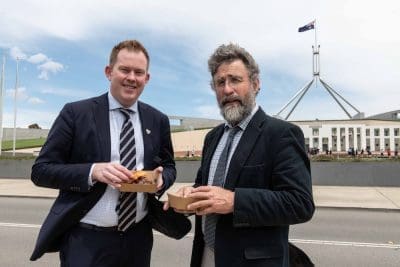
NSW Farmers’ Peter Arkle and James Jackson.
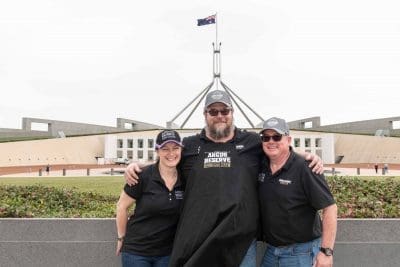
The Angus Reserve crew.
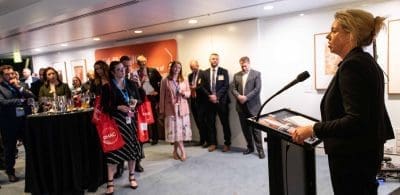
Minister McKenzie launches Red Meat 2030.
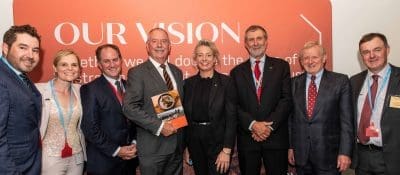
Minister McKenzie with the RMAC board.
